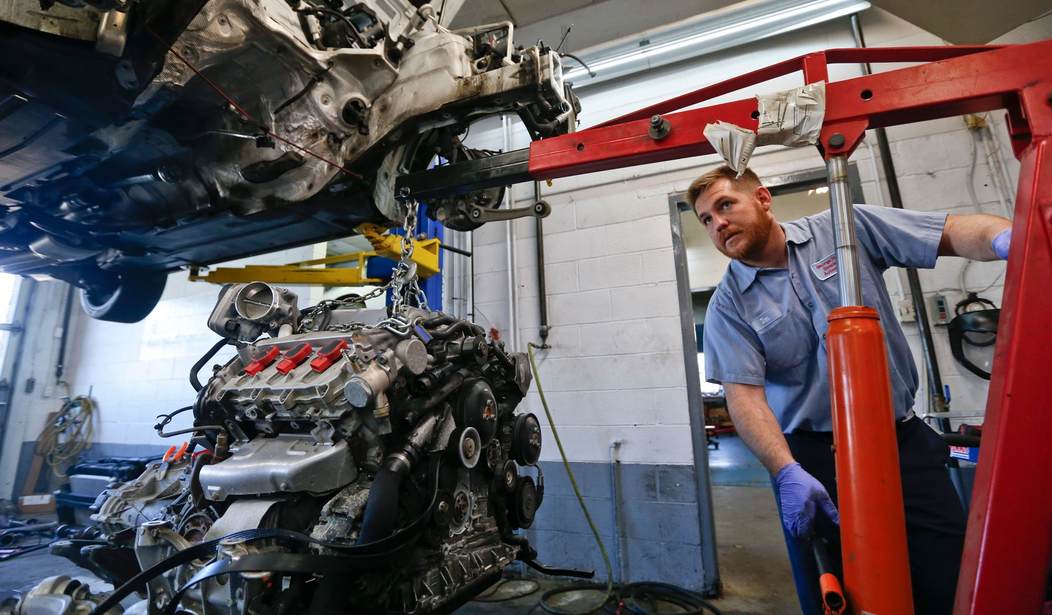In today’s polarized political climate, there are very few pieces of legislation that can bring together policymakers from both sides of the aisle. This situation has resulted in many bills that could benefit the majority of Americans dying in Congress and being all but abandoned.
Over the summer, Rep. Darrell Issa (R-CA) introduced the Save Money on Auto-Repair Transportation Act, otherwise known as the SMART Act. This bill -- co-sponsored by three Democrats and two additional Republicans – has the opportunity to buck that trend and benefit working class households all over America.
Why the SMART Act? According to the U.S. Bureau of Labor Statistics, vehicle repair costs have skyrocketed 60 percent since the year 2000. This repair increase has been almost exclusively driven by automakers abusing design patents to choke out competition and monopolize their business. According to the Consumer Access to Repair (CAR) Coalition’s latest study, design patents are up a whopping 156 percent since the year 2000, coinciding with repair price increases.
Patents were included in the Constitution by our founders to encourage ingenuity and entrepreneurship. When a new product is created, a patent is a safe way for the original inventor to secure their intellectual property and keep it from being duplicated. There are two basic classifications of patents that can be applied for: a utility patent, and a design patent. Utility patents protect the functionality of a product, while a design patent protects the visual appearance.
Recommended
Traditionally an automaker would apply for utility patents for elements of the vehicle that are unique to their brand. An example of a proper patent would be Ford patenting their V8 GT engine used in the Mustang or even the specific design of an ornamentation like the grill on a Jeep or the stick shift design on a Mercedes. If left unpatented, competitors would immediately copy both the functional elements and design of the engine.
What automakers have been doing the last 20 years has not been in the interest of protecting their intellectual property, but rather to create a patent thicket to crowd out competition by non-dealership repairs. If an automaker applies for a patent on a common part such as a mirror or a bumper, all they need to prove to the U.S. Patent and Trademark Office (USPTO) is that their design is just slightly different than any others on the market. These design patents extend 15 years which in many cases is the entire life of the vehicle while it holds any significant value. Now, instead of a car having four to five patents, almost every part is manufactured with a slight visual difference (or sometimes a defect) and slapped with a patent, rendering that automaker the sole manufacturer, seller and installer of that part.
The effects of this patent abuse have been twofold. Aftermarket auto-repair shops are being forced to operate in a market that is growing smaller by the day. A 2020 study conducted by IMR Automotive Market Research found that 91 percent of auto repair shops reported a decrease in revenue that year. This follows a trend seen since the turn of the century. The more parts that are protected by automakers, the less parts that are available for these aftermarket repair shops to sell and install, effectively pushing them out of business. Without a competitive aftermarket environment, automakers have been able to drive up prices, often charging hundreds of dollars more for simple parts like mirrors, bumpers or fenders. It is for this very reason that consumers seek out aftermarket or non-dealer repairs.
The ultimate loser here is the consumer – especially the working class. With little to no options for repair, car owners are held hostage by the automaker industry, paying prices that are unreasonable and unethical. Clearly a solution is needed. Reducing design patent length from 15 years to 2.5 years for common car parts such as mirrors and bumpers to be patented, as the SMART Act does, is a much-needed reform.
These actions are overwhelmingly supported by both the auto-repair industry and the American people. According to the same CAR Coalition survey referenced above, 78 percent support allowing consumers to decide where and how to repair their vehicle, 92 percent agree consumers should be able to choose between automaker branded and aftermarket parts, and 75 percent believe common car parts shouldn’t be covered by design patents.
Legislators who are interested in supporting American consumers should be eager to advance the SMART act through the House and Senate. Regulations placed on any industry should be aimed at increasing competition and promoting a fair and free market. This legislation checks all of those boxes and presents a rare opportunity for policymakers to reach across the aisle and do what is right for the American people.
Horace Cooper is a legal commentator and a senior fellow with the National Center for Public Policy Research

























Join the conversation as a VIP Member